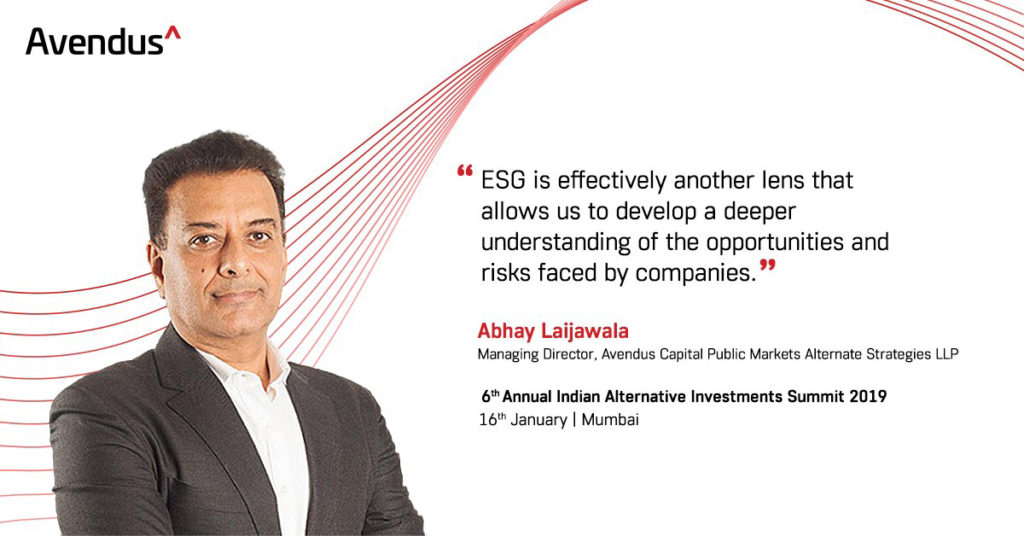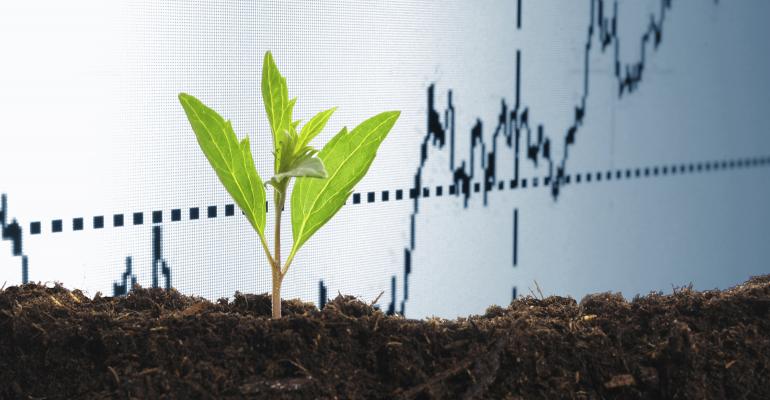Mumbai-based Avendus Capital had announced its intent to launch a $ One Billion ESG (Environmental, Social and Governance) Fund in August 2018. On February 1, 2019, it started investing by picking 20 stocks.
Avendus’ ESG fund is India’s first independent open-ended fund. It will invest in large cap companies, preferably the top 100 listed on the National Stock Exchange. Its exclusive tie-up with Institutional Investor Advisory Services (IiAS), a SEBI registered independent rankings advisor, will help in providing credibility to its decisions.
It has roped in big names onto its advisor board. It includes Rakesh Mohan – former Deputy Governor of the Reserve Bank of India, Amit Tandon – Founder and Managing Director of IiAS, Melissa Brown – Board Director of Sustainalytics, a global leader in ESG and corporate governance research and ratings.

Abhay Laijawala, MD & Fund Manager, Avendus Capital Public Markets Alternate Strategies, told sustainabilitynext that it plans to raise $ One Billion over the next two years. While the split between offshore and domestic share is likely to be 70% and 30% respectively, he hopes it becomes 50 – 50 soon.
Appetite for ESG investing is expected to grow in India especially after recent findings of large-scale fraud by truant promoters. Investors have lost sizable assets in value dilution.
Analysts believe that investors could have avoided getting hurt by rogue firms’ corporate governance standards resulting in bankruptcies if they had chosen to invest in ESG-linked stocks.
Even though India had a few funds dedicated to Ethical investing, Avendus will clearly be the first big market mover. Close on heals will be another $ One Billion fund announced recently by former Tata executives lead by Mukund Rajan.
Unlike Avendus Capital’s ESG fund, the yet-to-be-named fund, will be investing through the private equity route and typically in mid-size firms. This fund is expected to take off in about six months. Unlike the others, the founders hope to take on active advisory roles.
Laijawala says Indian investors will soon have credible, long-term risk-adjusted investment solutions with ESG matrix as a prime differentiator. “This is still a new concept in India but is resonating very well, especially after recent exposes.”
ESG Delivers Higher Return
Between September 2007 and July 2018, companies in the MSCI India ESG Leaders Index delivered a gross annualized return of 11.67% versus 7.52% for the companies in the MSCI India Index, states a report that quotes Avendus Capital.
A Bank of America Merrill Lynch study shows that stocks that ranked within the top third by ESG scores outperformed stocks in the bottom third by 18% percentage points in the 2005-2015 time period.
SBI Magnum Equity ESG Fund shows a return in excess of 14% as on 31 December 2018. Interestingly, the letters ESG were added to the 1991 fund only in May 2018. It will still be the pioneer fund in the Indian mutual funds industry to invest in companies that follow the ESG criteria. The fund size in January 2019 was over 2100 crore.
Global Trend

According to recent Amundi Asset Management’s findings “Responsible investing has become a beta strategy in Eurozone (as ESG is a risk factor, but remains an alpha strategy in North America (as ESG is not a risk factor). Introducing ESG as a factor into a multi-factor approach of portfolio construction adds value by improving the diversification in the Eurozone, but not in North America.
Vincent Mortier, Group Deputy CIO at Amundi says: “Our research confirms that ESG integration generates a tangible impact on equity performance in Europe and North America. By favoring a best-in-class ESG approach, investors are able to benefit from an investment strategy that improves the long-term performance of the portfolios”
French asset manager Amundi SA recently said it intends to have all its funds rated according to ESG criteria by 2021. It also said it will vote according to ESG criteria in all shareholder meetings of companies it holds share in.
According to a January 17, 2019 article in HBR “In the beginning of 2018, $11.6 trillion of all professionally managed assets—one $1 of every $4 invested in the United States—were under ESG investment strategies, a sharp increase from 2010, when the amount was close to just $3 trillion overall.”
BlackRock recently predicted that the investment in ESG funds will rise to more than $400 billion over the next ten years.
What Constitutes ESG?
The E in ESG stands for Environmental. The metrics for ‘E’ are direct energy consumption, carbon intensity, indirect energy consumption, energy intensity, primary energy source, renewable energy intensity, water management, waste management, environmental policy, and environmental impact.
The ‘S’ for social metrics are CEO pay ratio, gender pay ratio, employee turnover ratio, gender diversity, temporary worker ratio, non-discrimination policy, injury rate, global health policy, child and forced labor policy, human rights policy, human rights violations, and board diversity.
The Governance (G) metrics are board separation of powers, board transparent practices, incentivized pay, fair labor practices, supplier code of conduct, ethics code of conduct, bribery, tax transparency and sustainability report.
By Benedict Paramanand













